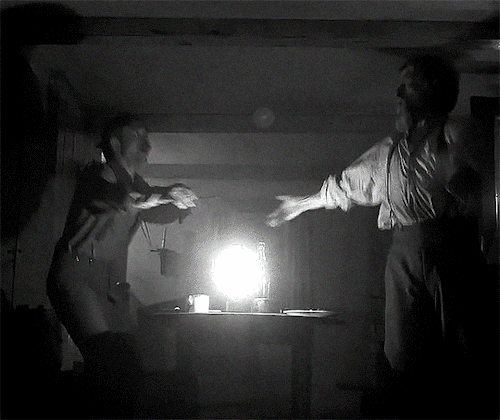Five Fun Facts From The Lighthouse Q&A At Cannes w/Robert Eggers, Robert Pattinson, & Willem Dafoe
Robert Eggers is easily one of our favorite new directors to have emerged over the past couple of years. His debut The VVitch delivered the Puritan nightmare folk horror we never knew we needed but now can’t live without. In anticipation of the release of his next film, The Lighthouse (which, honestly, cannot come soon enough), we recently stumbled upon a video of the Cannes Q&A with writer/director Robert Eggers and stars Willem Dafoe and Robert Pattinson, which we’ve mined for interesting details about the film and its production.
The conversation gives insight into the hardships of filming under harsh conditions, as well as some of the challenges the actors faced — and more! — and the full video of the entire conversation can be found at the bottom of the article, which we’d recommend watching/listening in full. However, in this modern age, we know how valuable time can be, so we’ve done the heavy lifting for you. We’ve listed what we feel are the most interesting nuggets for your reading pleasure, but be warned: there are minor SPOILERS below, so if you’re a cinema purist, you may not want to sail down these seas quite yet.
Robert Pattinson accredits the rehearsal process as the key to building up the necessary pressure for his character during shooting.
Robert Pattinson: My character is so quiet and buttoned up. I was afraid to really show anything in the rehearsals, so it was kind of nice to have that pressure cooker of an environment. We were just in a little room in a hotel in Halifax, and there’s something about being contained in there and not really showing anything that it built up this pressure for the shoot. It was an interesting environment to work in.
Willem Dafoe sought out Robert Eggers after seeing The VVitch and was appreciative of all the research Eggers puts into his projects.
Willem Dafoe: I love rehearsals. I don’t always require it, but I love it, particularly with a heavy text and a complicated cinema language. I’d seen The VVitch, and I thought it was a beautifully made film. I really sought out a meeting with Robert and said, ‘Please, let’s do something together.’ And this was that something. Before we even got together for rehearsal, he did a lot of research. He gave Rob and I a lot of stuff about lighthouses, period writings from the time, dialect tapes, songs from the time, many things, so there was a wealth of stuff to work with. So there was a nice preparation, and then, like all preparation, you kind of throw it all out once you get there because the principle thing you’re dealing with while you’re there is the elements. The weather, basically.
Surprisingly very little “movie magic” was involved; much of the inclimate weather depicted in the film is real.
Robert Eggers: We built every building that you see in the film. We couldn’t find a period lighthouse that worked for us that wasn’t on a remote island that would be impossible to get to, so we shot on the southern tip of Nova Scotia on this peninsula of volcanic rock at Cape Forchu. And, yeah, we built a 70-foot working lighthouse that could shine for 16 miles they told me.
Forchu was a very unforgiving place. There’s no trees, and the wind is relentless. The wind could be blowing so loud that I couldn’t hear Rob or Willem who were both [standing right next to me].
I think we wouldn’t have had the believability of the atmosphere and the environment and the ability of the storm if we weren’t actually shooting in it. There’s many scenes where you might think that we have wind machines and rain machines m, and we don’t. I mean, we used them, too, but often times, the most crazy dramatic moments were photographed for real.
There was one scene in particular where Pattinson felt “his life was in his hands” during every take.
Robert Pattinson: [The most challenging scene] was probably running to go meet the siren. It doesn’t look how death defying that actually was, but we were literally running through rocks that were like blades with kind of period-correct shoes on. That was one of the more terrifying things I think I’ve ever done in my life. You would want to walk actually very trepidatiously, but trying to sprint through that, I felt like my life was in my hands every single time we were doing it.
Robert Eggers and his brother, Mark, who co-authored the script, read a lot of period text, including Herman Melville and Sarah Oren Jewett, when crafting the dialogue.
Robert Eggers: My brother and I read a lot of period texts to try to absorb the feeling and the vibe of how people would speak, and [Herman] Melville was certainly something that we turned to. I think there’s similar mythological sign posts and warning things that happen here that happen in Moby Dick, even though they’re different. Sarah Orne Jewett is a Maine-based writer who was particularly helpful tony brother and I because she would interview farmers and sailors in the late 19th century, and then write her work in dialect. So Rob’s dialect is based on down east farmers and Willem’s dialect is based on maritime dialects.
Hankering for more?! Check out the full conversation below:
What do you think? Learn anything cool? More amped up for the film? We want to know. Share your thoughts and feelings in the comments section below, and as always, remember to viddy well!

